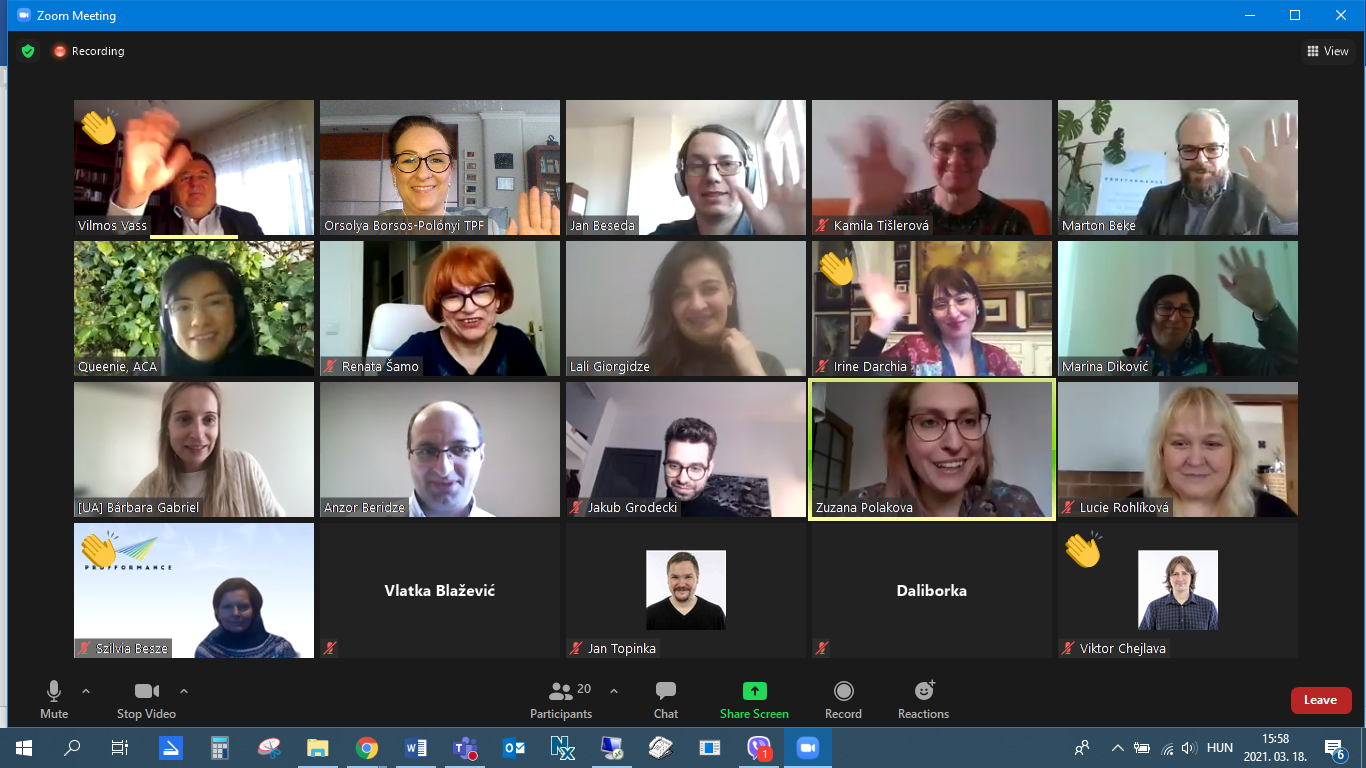2021-05-13 13:57:56
Towards a 2D and 3D competence matrix of teachers - results of the PLA organised by Czechia
PROFFORMANCE experts have introduced a new dimension into the higher education teachers' competence matrix.
The process of creating an assessment tool for the higher education teachers reached a new phase with a Peer Learning Activity organised in March 2021. The PLA was a 2 day event held online in Zoom platform (instead of the originally planned venue, Prague), the first day took place on Thursday 4th March and the second on Thursday 18th March.
The organizers were the Czech consortium partners: the Ministry of Education, Youth and Sport of Czechia and the Czech National Agency for International Education and Research. The main contributors were Jan Beseda (Centre for Higher Education Studies), Zuzana Poláková (Ministry of Education, Youth and Sport) and Lucie Rohlíková (University of West Bohemia), Daliborka Luketic (University of Zadar), Vilmos Vass (Budapest Metropolitan University), On both days nearly 30 experts took active part.
The 2nd PLA had 3 main goals:
- Connecting Vertical and Horizontal Aspects of Competency Framework
- Prepare a framework of 3rd dimension layer of Assesment Tools (decide on which actors assess which competency)
- Prepare the 3D structure of Assessment Tools
1st day
On Thursday 4th March PROFFORMANCE experts discussed the role of Horizontal Aspects: Digitalization, Universal Design and Internationalization. The event started with Vilmos Vass and Daliborka Luketić, who presented the results of 1st PLA. After that invited experts talked about the horizontal aspects in teacher’s perfomance. First, Stefania Bocconi (National Research Council of Italy, Institute for Educational Technology) spoke about the project SELFIE, which is focused on digital competencies of teachers. Terry Maguire (Director of National Forum for the Enhancement of Teaching and Learning, Ireland) presented the aspects of the Universal Design in higher education. The DIGI-HE team (Alison Morrisroe, Policy and Project Officer, European University Association, Airina Volungevičiené, Director of Institute of Innovate Studies, Vytautas Magnus University and Mark Brown, Director of National Institute for Digital Learning, Dublin City University) gave a lecture about their project, which inquires the role of Digitalization in higher education teaching and learning. Finally, Uwe Brandenburg (Global Impact Institute, Czech Republic) pointed out on important aspects of Internalization in higher education teachers’ performance.
Small working groups were organized and worked both synchronously and asynchronously on their part of the Competency 2D Matrix until 11th March. Group A was dedicated to Digitalisation, Group B tested Universal Design and Group C was responsible for Internationalization.
2nd day
The second day focused on finishing the 3D Matrix. After the non-formal opening, Jan Beseda and Vilmos Vass reflected on previous work. Then two presentations followed on self-reflection tools in higher education. Firstly, Ninoslav Šcukanec Schmidt (Institute for the Development of Education, Croatia) presented the result of the project TEFCE which is focused on self-reflection of community engagement in higher education. Then Maria Palladino (European Commission) showed how to use HEInnovate for self-reflection of enterpreurship and innovation. After the presentations the stakeholders continued the discussion on how to assess teachers’ performance in higher education.
Working groups were organized again maximum 7 persons in each, working on their own Competency Matrix 3D Structure till 25th March. Group A was responsible for Teachers-self / Teachers peers’ assessment, Group B tested External Stakeholders contribution and Group C was dedicated to Students/HEI management.
Main outputs of PLA2
- Working Groups prepared about 80% of the 3D Matrix while some areas need to be further discussed (e. g. the horizontal aspects)
- Working definition of horizontal aspects has been created.
- Working definition of competence used in the project has been defined.
- Role of stakeholders was defined, however the external stakeholders have not been fully specified, this will need further discussions.
- Students as population and as representatives have to be distinguished (e.g. in issues about Quality Assurance students do not have the competences for assessment, but their representatives do).


















